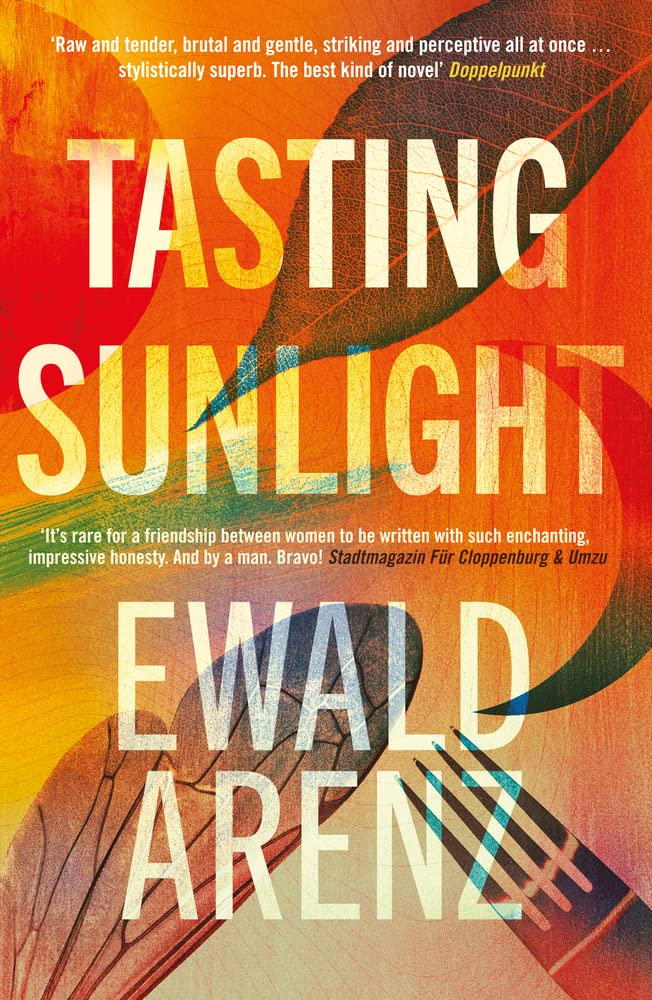You are viewing your 1 free article this month. Login to read more articles.
Ewald Arenz in conversation about the success of his first translated novel
German bestseller Ewald Arenz discusses Tasting Sunlight, his first novel to be translated into English.
When we begin our Zoom, Ewald Arenz apologises for his English which, as you might imagine, is completely unnecessary for, like many educated Germans, he speaks the Queen’s English better than 90% of Britons. I also point out that, in addition to being one of Germany’s biggest selling authors at the moment, he has a day job as a gymnasium [about equivalent to sixth form college] English teacher, to which he deadpans: “Yeah, but I’m a better German writer than I am an English teacher.”
Arenz might be one of the most prolific and, latterly, top-selling German authors you have never heard of. He has published 20 novels and short story collections since his début was released in 1994 when he was 29, yet he is only now being translated into English for the first time with Tasting Sunlight (Orenda, 23rd June). Arenz may not have been previously picked up by Anglophone publishers as he is hard to pin down, with his novels ranging across comic, speculative, contemporary, historical and magical realist themes. And a lot of his work is based in his native Franconia, the picturesque but somewhat unsexy region (sorry Franconians!) that may not be as appealing a setting to acquiring English-language editors as, say, hipster Hamburg or trendy Berlin.
Arenz has been harder to ignore of late; though his books had previously sold respectably, he had a huge breakout with Tasting Sunlight, published as Alte Sorten (“Old Varieties”, as in pears) in German. It hit the bestseller list in hardback in 2019, but soared to the stratosphere during the pandemic in paperback, going on to shift more than 400,000 units. His next, Der Grosse Sommer, hit the German number one spot in its début week and was Germany’s 15th-bestselling hardback of 2021 (Orenda aims to publish in 2024; its current working title is “One Grand Summer”). Perhaps not unrelated to the upward sales trajectory, Arenz switched publishers for Tasting Sunlight from the well-respected but relatively small Franconian indie ars vivendi to DuMont, the family-run Cologne conglomerate.
Rural escape
The pitch for Tasting Sunlight is “the German Where the Crawdads Sing” and there is something in that: both are rural-set tales focusing on people living on the fringes of society while harbouring dark secrets and hoping for redemption. It opens with Sally, a troubled 17-year-old who has run away from a clinic where she is being treated for anorexia and self-harming. A city girl, she is stranded in “this crappy countryside” until she meets Liss, who single-handedly runs an entire farm and who offers Sally a place to stay, no questions asked. In a nicely wry bit of culture clash, Sally mistakes Liss’ workwear for a “super-fashionable” boiler suit/headscarf combo. But Liss has problems of her own: she is isolated from society and, we learn, deeply damaged by events from her past. The two form an unlikely friendship and start a road to recovery, helped by the healing power of nature.
A lot of people depict rural life as happy chickens, happy cows and happy farmers. That’s not fair, because it’s not the truth
The genesis of the story came partially from Arenz’s teaching, partially from some personal experiences: “My daughter is 27 now but when she was 16 or 17, she had self-harmed, cut herself. I didn’t know at the time, my wife didn’t know, and we didn’t find out until she told us years later. So we talked to her a lot, and a bit of that went into the book. As a teacher, I encounter a lot of girls who are 17 or 18 who have these troubles, too. This one student was 18, and she no longer lived with her parents, so no-one could do anything for her if she didn’t agree to be helped. And in the summer holidays, she died of suicide. It’s 10 years ago, but I still think of it a lot. So I wanted to write a story of healing through nature. I know it sounds a bit cheesy, but I come from a small village and I used to work in the fresh air, used to have my hands in the soil, so I thought this would be a starting point.”
In fact, it’s anything but cheesy. Though Tasting Sunlight is celebratory, it is simultaneously a wholly unsentimental view of the countryside. Arenz thinks that may be down to Franconian rural life, which is hardly an idyll. “My father was a country pastor and we grew up in a very poor, isolated village in this cold, 400-year-old parsonage with metre-thick stone walls; it was sort of like the Brontës. Franconia is not like Southern Bavaria, where the soil is rich and everything grows easily. It can be very cold, you plough up a lot of stones and it’s not an easy life to be a farmer there… A lot of people depict rural life as happy chickens, happy cows and happy farmers. That’s not fair, because it’s not the truth. Literature, of course, it’s never true; authors lie about everything. There is beauty in the countryside, but I wanted to show that it’s hard, back-breaking work sometimes, too.”
Tasting Sunlight was translated by Norwich-based Rachel Ward, who will also be working on Der Grosse Sommer.
Arenz says: “Because I am capable enough in English I probably really got into this process a bit more [than my other translated titles]. Rachel had a huge list of questions, but what was really interesting is that a lot of them were not necessarily for the text but her deeper understanding of the book. Like when I wrote ‘wood pile’, she asked ‘How was the wood piled up?’ A great question, as there is a particular way of piling wood into a round shape in Franconia. So we would end up sending pictures via email; there was a lot of back and forth.”
English is great as I teach older students, and at that level it’s mostly about conversation. I’m a lazy teacher, so if I have no lesson plan, I can just say: ‘Um, right, let’s talk about the British parliament’
That bucolic Franconian upbringing sounds wonderfully old-fashioned in some ways: the parsonage had the only phone in the village, which people would pop in to use, while a spare room was converted into the community library. But it was hardly traditional, as Arenz’s parents were deeply engaged in the politics of the 1960s and ’70s; his father was “more philosopher than pastor”, his mother would occasionally leave to go on retreats to Indian ashrams and it was a very literate, arty household. (His sister Sigrun is now a crime novelist, his brother Helwig an actor and writer.)
Childhood dream
Arenz always wanted to be an author and began writing around the age of 13. After a brief flirtation with law at university in Nuremberg, he went on to get a degree in English and American literature and history. After university he did odd jobs to support his writing—construction, warehouse work—but he became a father at 23 “almost by accident”. To juggle being a parent, writing and making a living, he needed a job that was not so physically taxing,
so he moved into teaching and has been at the same school in Fürth for more than two decades: “English is great as I teach older students, and at that level it’s mostly about conversation. I’m a lazy teacher, so if I have no lesson plan, I can just say: ‘Um, right, let’s talk about the British parliament’.”
He has recently moved part-time and writes on his days off, as well as before and after classes. Do his students read his books? “No, but occasionally someone comes up to me after class looking shifty to mumble: ‘My mother read your book, can you sign it?’”
Arenz has a very particular and recognisable fashion style (one that I am totally here for), sort of a Weimar Republic chic: vintage suits, flat caps, the occasional boater. Is this some sort of author brand-building?
“I started to wear suits all the time when I was 16 or 17, maybe because no-one else was doing it. I was also reading a lot of Byron and I wanted to dress in a dandified way like him, because I thought I would be a genius like him. And sure, now there is some kind of branding to it, but I just like to be well-dressed against all the misfortunes of the world.”
Perhaps because of his great interest in British and American literature, he is energised by his Anglophone début: “Almost everything goes the different direction, doesn’t it? From England or America, to Germany. Only very few German books go to the English market because you have so much to read. I never thought I would make it, so it’s really an exciting thing.”











